For cleaner, healthier air, consider the top five medical-grade air purifiers of 2024. The HATHASPACE Smart Air Purifier excels with its True HEPA filter, covering large spaces. The IQAir GC MultiGas is perfect for chemical sensitivities, while the PuroAir offers smart features and a wide coverage area. If you need even more power, the IQAir HealthPro Plus is ideal for larger rooms. Finally, the LEVOIT Essential 200S-P combines efficiency with smart controls for maximum convenience. You can explore more details about each option, ensuring you find the perfect fit for your space.
HATHASPACE Smart Air Purifier (HSP002)
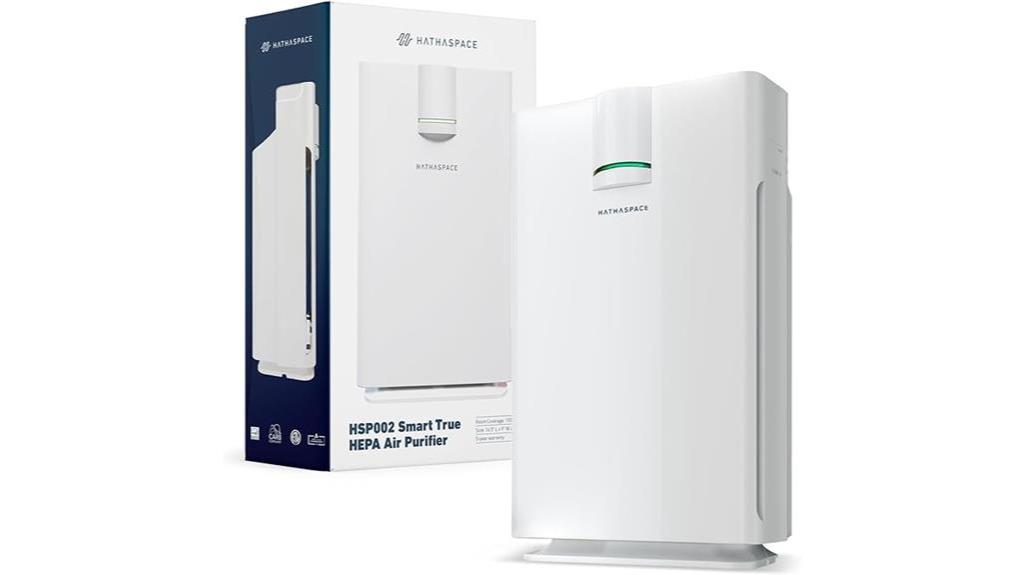
If you're someone who suffers from allergies or has sensitivities to indoor air pollutants, the HATHASPACE Smart Air Purifier (HSP002) might just be the perfect solution for you. This purifier features a True HEPA filter that captures 99.9% of particles down to 0.3 microns, making it highly effective in reducing allergens, smoke, and odors. It's suitable for large rooms up to 1500 sq. ft., and its lightweight design allows for easy portability. I love the smart air quality sensor and the touch-screen display that lets me monitor air quality effortlessly. Plus, the auto mode adjusts the settings based on real-time conditions, ensuring my space remains fresh and clean without any excessive noise.
Best For: Individuals suffering from allergies or sensitivities to indoor air pollutants who need an effective air purification solution for large spaces.
Pros:
- True HEPA filter captures 99.9% of particles, significantly improving air quality.
- Lightweight and portable design makes it easy to move between rooms.
- Smart features like auto mode and a touch-screen display enhance user convenience.
Cons:
- Filter replacement is required every 3-4 months, adding to ongoing maintenance costs.
- Subscription option for filters may not appeal to all users.
- Initial investment might be higher compared to some competitors.
IQAir GC MultiGas Medical-Grade Air Purifier
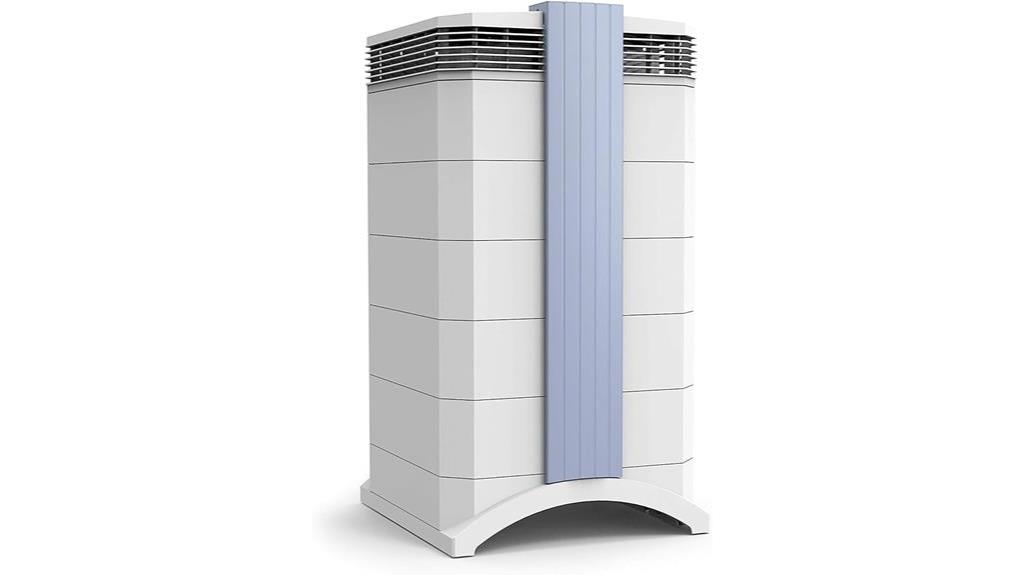
The IQAir GC MultiGas Medical-Grade Air Purifier stands out as the ideal choice for individuals suffering from multiple chemical sensitivities (MCS) or those exposed to tobacco smoke. It's designed specifically to combat chemicals, gases, and odors, utilizing a HyperHEPA filter that captures 99% of contaminants down to .003 microns. I've seen how effectively it pulls out pollutants like mold, dust, and formaldehyde, making a noticeable difference in air quality. Users rave about its performance, especially in homes with pets or smoke exposure. While the filter replacement costs about $300, many find the longevity and effectiveness justify the investment. Just be aware of potential sweet smells if you have extreme sensitivities. Overall, it's an excellent choice for cleaner air.
Best For: Individuals suffering from multiple chemical sensitivities (MCS) and those exposed to tobacco smoke seeking effective air purification.
Pros:
- Utilizes advanced HyperHEPA technology, capturing 99% of airborne contaminants down to .003 microns.
- Improves air quality significantly, providing relief for allergy sufferers and those with respiratory issues.
- Long-lasting filters that justify the initial investment due to their durability and performance.
Cons:
- Filter replacement costs can be high, averaging around $300.
- Some users report a sweet smell emitted by the unit, which may affect those with extreme sensitivities.
- Variable effectiveness noted for specific gases like NO2, SO2, and O3 depending on room size and height.
PuroAir Air Purifier for Homes (Covers 1,115 Sq Ft)
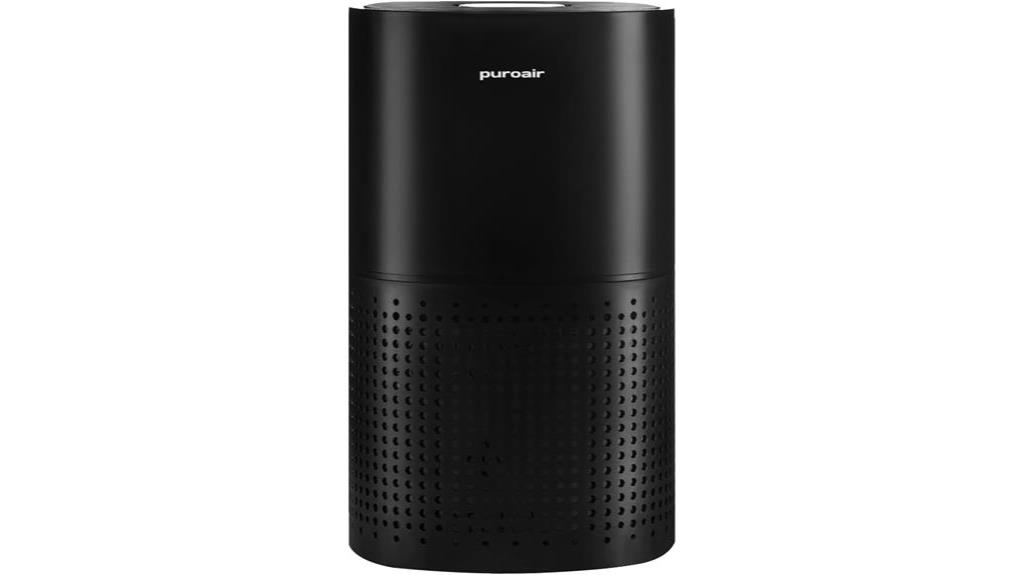
For those battling allergies or living in areas with high pollution levels, the PuroAir Air Purifier is a game-changer. With its impressive coverage of 1,115 square feet, this powerful purifier cleans the air automatically, operating 24/7 in homes and offices. It effectively filters up to 99% of smoke, pollen, and common pollutants, capturing particles as small as 0.1 microns. I noticed a significant improvement in air quality within just 15 minutes of use, thanks to its smart particle sensor that adjusts power based on current air conditions. The quiet operation and user-friendly features, including a timer and sleep mode, make it easy to maintain. Just keep in mind that replacement filters can be a bit pricey.
Best For: Those experiencing allergies or living in high pollution areas seeking effective air purification.
Pros:
- Filters up to 99% of smoke, pollen, and pollutants, improving air quality quickly.
- Quiet operation with user-friendly features like timer, sleep mode, and child lock.
- Covers a large area of 1,115 sq ft, making it suitable for homes and offices.
Cons:
- Replacement filters can be expensive and their longevity varies based on home conditions.
- Lightweight construction may raise concerns about durability.
- Requires a step-down unit for 240V systems due to voltage compatibility issues.
IQAir HealthPro Plus Medical-Grade Air Purifier (Three-Pack)
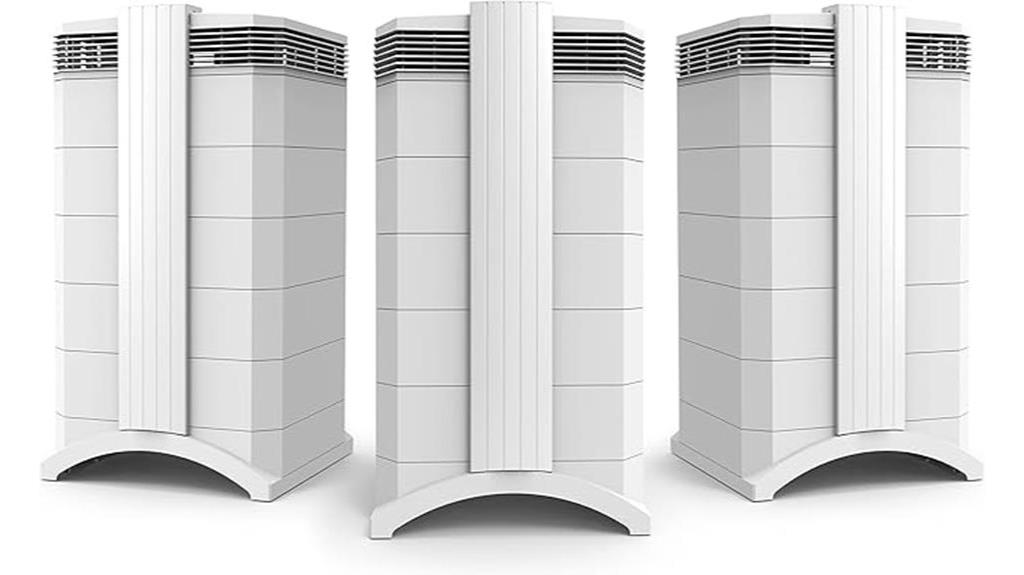
Looking for an air purifier that can tackle the tiniest airborne particles? The IQAir HealthPro Plus Medical-Grade Air Purifier is an excellent choice, especially when you get it in a three-pack. With its HyperHEPA filter, it captures particles as small as 0.003 microns, ensuring cleaner air. Each unit covers a generous area of up to 3,375 sq ft, making it ideal for larger spaces. You'll appreciate its quiet operation and smart features, like remote monitoring through the IQAir Air Visual App. Plus, the sleek design seamlessly fits into any room. Customer feedback highlights significant improvements in air quality and allergy relief. Overall, it's a smart investment for healthier living, especially in polluted environments.
Best For: Those seeking a high-performance air purifier to effectively eliminate ultrafine particles and improve air quality in large spaces.
Pros:
- Effective filtration for particles as small as 0.003 microns, making it suitable for allergy sufferers and those with respiratory issues.
- Smart features like remote monitoring and automated fan speed adjustment enhance user convenience and air quality management.
- Quiet operation on lower speeds allows for use in bedrooms and living areas without disruptive noise.
Cons:
- Higher initial cost compared to standard air purifiers, which may be a barrier for some consumers.
- Weight and size can make it less portable and harder to move between rooms compared to smaller models.
- Warranty concerns if purchased from unauthorized dealers, potentially leading to issues with support and service.
LEVOIT Air Purifiers for Home Large Room (Vital 200S-P)
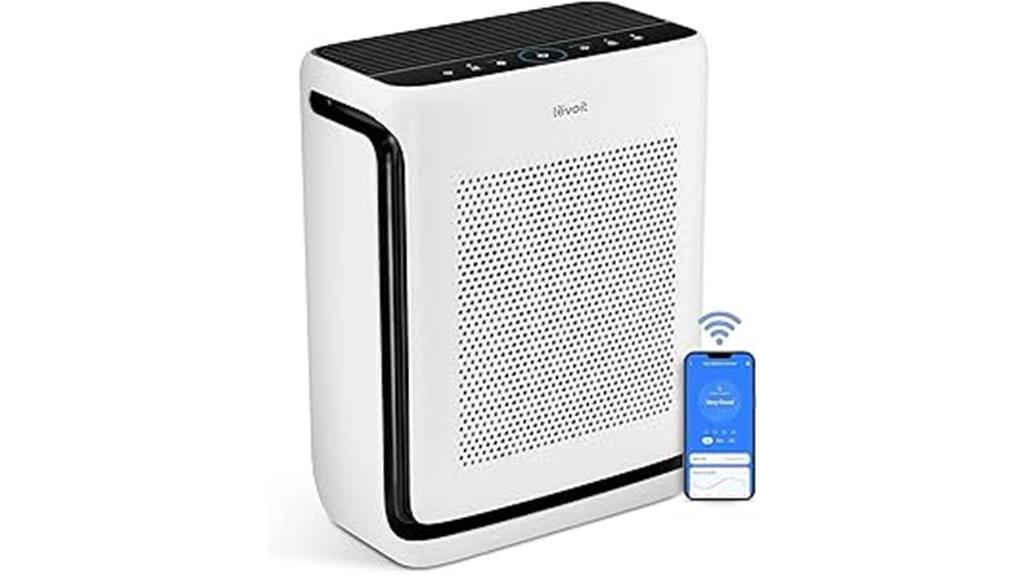
Designed with allergy sufferers and pet owners in mind, the LEVOIT Essential 200S-P air purifier stands out as a reliable solution for those seeking cleaner air in large spaces. It efficiently purifies areas up to 1800 ft², boasting a CADR of 242 CFM for smoke-free environments. Its 3-stage filtration system captures 99.97% of ultra-fine particles, including pollen and pet dander, ensuring fresh air. I love its smart features, like the VeSync app control and automatic adjustments based on air quality. Plus, it operates quietly in Sleep Mode, making it perfect for bedrooms. The washable pre-filter extends the life of the main filters, and users have praised its effectiveness and reasonable maintenance costs. It's a fantastic investment for improved indoor air quality.
Best For: Allergy sufferers and pet owners looking for effective air purification in large spaces.
Pros:
- Effective 3-stage filtration system captures 99.97% of ultra-fine particles, improving air quality.
- Smart features allow for convenient control through the VeSync app and voice commands via Alexa.
- Quiet operation in Sleep Mode ensures undisturbed rest, making it ideal for bedrooms.
Cons:
- Initial investment may be higher compared to basic air purifiers.
- Replacement filters may need to be purchased periodically, adding to long-term costs.
- Larger size may not fit well in smaller rooms or spaces.
Factors to Consider When Choosing Medical-Grade Air Purifiers
When you're choosing a medical-grade air purifier, it's essential to take into account factors like filtration technology effectiveness and room size coverage. Maintenance costs and noise levels can also influence your decision, along with any smart features that might enhance usability. By weighing these points, you can find the right air purifier for your needs.
Filtration Technology Effectiveness
Choosing the right medical-grade air purifier involves understanding several key factors that influence filtration technology effectiveness. First, look for advanced filtration technologies like HEPA and HyperHEPA filters. These can capture up to 99.97% of particles as small as 0.1 microns, greatly enhancing air quality in your space. If you're concerned about odors, gases, or volatile organic compounds (VOCs), consider a unit with activated carbon filters, which tackle a broader range of pollutants.
Next, pay attention to the Clean Air Delivery Rate (CADR). This metric measures how quickly and effectively a purifier cleans the air, with higher CADR values indicating better performance. It's especially important if you're addressing specific health issues, such as asthma triggers or allergens. Many medical-grade purifiers are designed with targeted filtration for sensitive individuals.
Lastly, remember that the longevity and effectiveness of these systems depend on regular maintenance. Timely filter replacements are essential for maintaining ideal air quality over time. By focusing on these factors, you can guarantee you choose a medical-grade air purifier that meets your needs and helps you breathe easier.
Room Size Coverage
Room size coverage is essential in selecting a medical-grade air purifier, as each unit is tailored for specific areas, typically ranging from 1,100 to 3,375 square feet. When you're choosing an air purifier, consider the coverage area it can effectively clean. Many units are designed for specific room sizes, so knowing the dimensions of your space is vital.
Ensure the air purifier's specifications include the Clean Air Delivery Rate (CADR), which measures the volume of filtered air delivered per minute. Higher CADR ratings indicate better performance in larger spaces, allowing you to make an informed decision. It's important to select a unit that can handle your room size without strain; overloading a purifier can diminish its effectiveness in removing pollutants.
Some air purifiers are optimized for larger areas and can clean the air several times per hour, ensuring consistent air quality in significant spaces. By understanding your room's dimensions, you can choose an air purifier that balances size with the ability to thoroughly circulate and purify the air, ultimately enhancing your indoor environment for cleaner, healthier living.
Maintenance and Costs
Maintaining a medical-grade air purifier can greatly impact your overall costs and performance. Typically, you'll need to replace filters every 3 to 12 months, depending on usage and air quality. Filter replacement costs can range from $50 to $300 per unit, so it's essential to factor this into your budget. Some brands offer subscription services for filter delivery, averaging between $49 and $300 annually, making it easier to manage your expenses.
Consider the longevity of the filters, as certain models can maintain their original filters for several seasons, which can save you money in the long run. However, premium models with advanced filtration systems often require multiple filter types, leading to higher maintenance costs over time.
Regular maintenance is key—cleaning pre-filters can extend the life of your primary filters, ultimately reducing overall replacement costs. This simple task guarantees your purifier runs efficiently and effectively. Before purchasing, evaluate the maintenance requirements and costs associated with each model to find the one that best fits your needs and budget. Making informed choices now can lead to better air quality and savings down the line.
Noise Levels
When selecting a medical-grade air purifier, noise levels play an essential role in your overall satisfaction, especially in quiet spaces like bedrooms or offices. You'll want an air purifier that operates quietly, allowing you to focus, sleep, or relax without distraction. Many high-quality models function at sound levels below 30 decibels on low settings, making them virtually silent while effectively cleaning your air.
Look for purifiers with multiple fan speed options, which can greatly enhance your comfort during nighttime or low-activity periods. This flexibility allows you to adjust the noise level based on your needs. Additionally, consider the design of the air purifier. Features like insulated motor mounts and high-quality fans can minimize operational noise, contributing to a more tranquil environment.
Some medical-grade air purifiers are specifically engineered to maintain low noise levels while delivering high airflow rates. This means you can enjoy efficient air purification without disruptive sounds that could interfere with your daily activities. By prioritizing noise levels in your selection process, you'll create a more pleasant and healthful atmosphere in your home or workspace.
Smart Features Available
How can smart features enhance your experience with medical-grade air purifiers? These innovative capabilities transform air purification from a basic task into a seamless part of your daily life. Many models come with smart air quality sensors that monitor real-time conditions, automatically adjusting fan speeds based on detected pollutants. This means you get superior performance without even thinking about it.
Mobile app integration is another game-changer, allowing you to remotely check air quality metrics like AQI, PM2.5, CO2 levels, and humidity. This added convenience keeps you informed about your environment at all times. Programmable settings and timers let you automate operation schedules, guaranteeing your air is always clean when you need it most.
Voice control compatibility with smart home systems provides hands-free operation, making it easy to integrate your purifier into your existing setup. Some purifiers even feature a "Smart Mode," enhancing performance based on real-time measurements. This not only improves air purity but also guarantees efficient energy use, saving you money in the long run. With these smart features, you're not just buying an air purifier; you're investing in a healthier, more convenient lifestyle.
Design and Portability
Which factors should you consider for design and portability when choosing a medical-grade air purifier? First, think about the size and weight of the unit. A lightweight and portable design makes it easy to move between rooms, allowing you to enjoy cleaner air wherever you need it.
Next, you want the air purifier to look good in your space. Models with a sleek, modern aesthetic can blend seamlessly with your home decor while still maintaining a professional appearance.
Don't forget to check for built-in wheels or handles, which add convenience if you plan to relocate the unit frequently. Evaluating the dimensions is essential too; make certain the air purifier fits comfortably in your intended area, without obstructing pathways or ventilation.
Lastly, prioritize user-friendly control panels and interfaces. An intuitive design enhances your overall experience and makes operating the purifier a breeze. By keeping these design and portability factors in mind, you can select a medical-grade air purifier that not only performs well but also suits your lifestyle and home environment.
Frequently Asked Questions
How Often Should I Replace the Filters in Medical-Grade Air Purifiers?
You should replace the filters in medical-grade air purifiers every 6 to 12 months, depending on usage and the model. If you run your purifier continuously or live in a high-pollution area, you might need to change the filters more often. It's a good idea to check the manufacturer's recommendations and monitor filter performance. Regular maintenance guarantees your purifier works effectively, keeping your air clean and healthy for you and your family.
Can Air Purifiers Eliminate Viruses and Bacteria Effectively?
Imagine breathing in fresh mountain air, free from harmful invaders. Air purifiers can indeed tackle viruses and bacteria, acting like your personal shield against microscopic threats. They often employ HEPA filters and UV-C light to trap and neutralize these pathogens effectively. However, while they reduce airborne germs, they're not a silver bullet. You still need to combine them with good hygiene practices to keep your space truly safe and healthy.
Are Medical-Grade Air Purifiers Noisy During Operation?
Medical-grade air purifiers can vary in noise level during operation. Many models are designed to operate quietly, especially those with advanced fan technology. You'll find options that work efficiently without disturbing your peace. However, some higher-powered purifiers might produce noticeable sound at maximum settings. It's important to check product specifications and user reviews for noise ratings, so you can choose one that fits your comfort needs while still providing excellent air purification.
Do Air Purifiers Consume a Lot of Electricity?
Air purifiers can vary in energy consumption, but most models are designed to be energy-efficient. You'll find that many modern air purifiers use around 50 to 100 watts, similar to running a light bulb. If you run your air purifier continuously, it might increase your electricity bill slightly, but the health benefits often outweigh the costs. Check for Energy Star ratings to guarantee you're getting an efficient model that saves you money in the long run.
Can I Use an Air Purifier in a Small Room?
Imagine this: you're in a small room, the air feels stuffy, and you wonder if an air purifier could change things. Well, you can absolutely use an air purifier in a small room! In fact, it's often more effective in confined spaces, helping to eliminate allergens and pollutants quickly. Just make sure to choose the right size for your room, and you'll breathe easier in no time, enjoying the fresh, clean air you deserve.
Wrapping Up
In the quest for cleaner, healthier air, investing in a medical-grade air purifier is like finding a hidden gem in a vast treasure chest. Each of these top contenders offers a unique blend of power and efficiency, ready to transform your space into a sanctuary of fresh air. So, gear up, make your choice, and breathe easy—your lungs will thank you for it!

Hi, I’m Charlie, and I cover all things laundry here at Appliance Mastery.
I’ve spent over eight years working on washing machines, dryers, and dishwashers. I also have a degree in mechanical engineering, which helps me understand how these appliances really work.
I try to make every guide clear and practical. If you’re stuck with a noisy dryer or a leaking washer, I’ll help you figure out what’s wrong and how to fix it.
